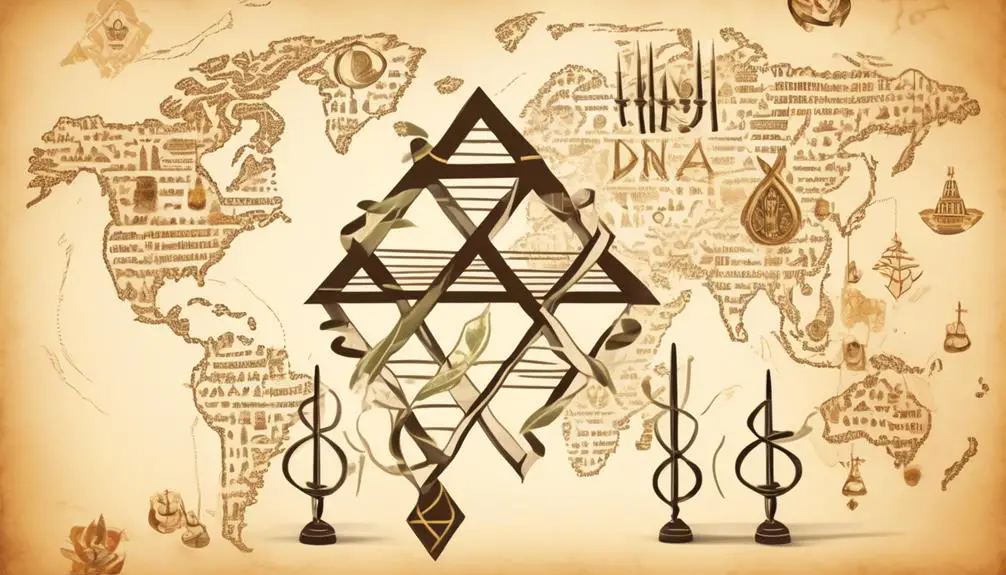As a genetic historian with a focus on Sephardic lineages, I believe that understanding our roots is akin to piecing together a mosaic of our past.
My experience with My Heritage DNA was enlightening; it was like holding a historical tapestry in my hands. I found nuances in my DNA that echoed the journeys of Sephardic Jews, from the Iberian Peninsula to the shores of North Africa and beyond.
This test was a gateway to my ancestry, revealing a chronicle of resilience and cultural fusion. It's a journey that I'm passionate about, as each result is a chapter in someone's personal saga.
Key Takeaways
- Sephardic DNA testing is complex and requires a comprehensive approach to genetic analysis.
- Testing multiple family members can provide a clearer picture of Sephardic DNA and ancestral connections.
- Different DNA tests, such as autosomal, Y-DNA, and mtDNA, have their strengths depending on the desired information.
- Sephardic DNA testing, when combined with historical research, can uncover rich ancestral roots and heritage.
Understanding Sephardic DNA Testing
To grasp the nuances of Sephardic DNA testing, it's essential to recognize the intricate genetic mosaic shaped by the Sephardic Jews' historical migrations, intermarriages, and conversions. Your Sephardic ancestry is a patchwork, reflecting various sub-groups and their unique genetic footprints.
When you delve into Sephardic DNA testing, you're entering a complex field where no single test can definitively confirm your Jewish DNA links.
Commercial genealogical companies offer varying degrees of analysis, but be wary of claims that BRCA mutations are conclusive proof of your Sephardic roots. They're not definitive markers.
To navigate this complexity, you might need to test multiple family members and even seek professional guidance.
Top DNA Tests for Sephardic Ancestry
If you're exploring your Sephardic roots, understanding which DNA tests can best reflect your unique ancestry is crucial. The complex nature of Sephardic DNA, with its rich history of migrations and intermarriages, requires a comprehensive approach to genetic analysis.
Here's what you need to know:
- Autosomal DNA Test: This test can give you a broad view of your genetic makeup, including potential links to the Sephardic community.
- Testing Multiple Relatives: To get a clearer picture of your Sephardic DNA, consider testing various family members, as DNA inheritance dilutes over generations.
- Comprehensive Analysis: Look for companies that offer detailed reports and access to large genetic databases for a more thorough understanding of your Sephardic ancestry.
Interpreting Your Sephardic Genetic Results

Once you receive your Sephardic genetic results, it's crucial to delve into the nuances of your DNA to fully grasp your ancestral connections. Sephardic genetic genealogy can be complex due to historical migrations, conversions, and intermarriages. Each Sephardic subgroup has a distinct genetic makeup, so the specific analysis your test provides is key.
While DNA testing can enhance your knowledge when combined with archival research, it's not a standalone tool for genealogical discovery.
Remember that the 'best' DNA test is subjective; different services have their strengths. Autosomal tests may uncover recent relatives, but to confirm deeper lineage, consider Y-DNA and mitochondrial DNA tests.
Tracing Sephardic surnames can be tricky, so a thorough interpretation of your genetic results is essential for a clearer picture of your heritage.
Case Studies: Sephardic Ancestry Discoveries
Understanding your Sephardic genetic results, let's explore real-life stories where individuals have uncovered their rich Sephardic roots through DNA testing and historical research. Here are three fascinating discoveries:
- From Iberian Peninsula to Present: One person's Sephardic DNA test revealed a significant percentage of Iberian ancestry. Coupled with archive research, they traced their Jewish ancestors back to 15th-century Spain, prior to the Inquisition.
- The Genealogical Puzzle: Another individual pieced together fragmented historical documents with their genetic findings, uncovering a lineage that connected to a known Sephardic surname.
- A Tapestry of Traditions: A family's DNA results displayed a mosaic of genetic markers typical of Sephardic Jews. Further research into marriage contracts and Inquisition records confirmed their ancestral ties to the Sephardim.
Choosing Your Ideal Sephardic DNA Test

When selecting the best Sephardic DNA test for your ancestry exploration, it's essential to consider the different types of tests available and their specific features. Understanding which test will best highlight your Sephardic DNA, possibly aiding in claims like Portuguese citizenship, is crucial.
Here's a quick guide:
| Test Type | Best For |
|---|---|
| Y-DNA | Paternal lineage of Iberian Jews |
| mtDNA | Maternal ancestry tracking |
| Autosomal | Finding distant relatives and diverse genetic origins |
Look for tests tailored to Sephardic ancestry for precise results. Remember, these tests can illuminate your heritage but are not definitive for nationality. Combine DNA findings with traditional research for comprehensive insights into your roots.
Frequently Asked Questions
How Do I Find Out if I Have Sephardic Jewish Ancestry?
You'll want to explore family stories, delve into Sephardic customs, and examine religious practices in your heritage to determine if you have Sephardic Jewish ancestry, alongside considering DNA testing options.
Is There a Sephardic DNA Test?
You won't find a specific "Sephardic DNA test," but you can look for genetic markers that suggest ethnic variations and ancestral patterns common in Sephardic Jewish lineages through broader Jewish ancestry tests.
Which DNA Test Is Most Accurate for Jewish?
You'll find autosomal DNA tests with Ashkenazi comparison and population-specific genetic markers are most accurate for determining your Jewish roots. They assess shared DNA to pinpoint your ethnic ancestry.
Where Do Sephardic Jews Trace Their Ancestry To?
You'd trace your Sephardic Jewish roots to the Iberian Peninsula, where cultural practices flourished before the expulsion, leading to the genetic diversity you see in descendants today.
Conclusion
Discovering your Sephardic roots is within reach. Choose a DNA test that delves deep into Jewish ancestry, like My Heritage DNA, for the most nuanced insight.
As you interpret your genetic results, you'll uncover connections to a rich cultural heritage. Whether you're confirming family stories or making new discoveries, the journey into your Sephardic lineage is an enlightening adventure.
Embrace this chance to connect with your ancestral past and enrich your sense of identity.

Throughout his career, Andras Kovacs has developed a deep understanding of DNA and its applications in genealogy and genetic testing. He has helped thousands of individuals uncover their ancestral heritage, using cutting-edge DNA analysis to trace family lineages and reveal connections across generations.

